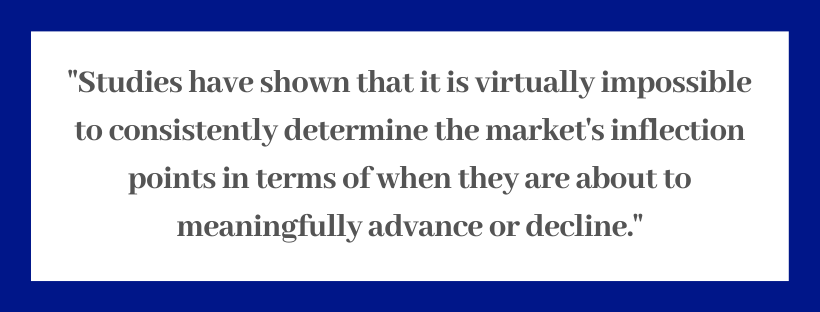Over the years, one of the most widely debated topics for investors has been the benefit, or cost, of attempting to time the movements of the financial markets. Many investors – in acknowledgment of their aversion to risk – have attempted to exit specific investments or market segments due to concerns related to a prospective decline in asset prices with the hope of subsequently re-entering those investments at lower, more attractive, price levels.
Why should I maintain my investments despite my speculations?
Specific to the stock market, numerous studies have been conducted over the years that have illustrated the cost of missing the days which exhibited the strongest returns over five, 10 or 25 days over a multi-year period.
For example, during the period 1980 through 2018, using the Standard & Poor’s 500 Index, if you had missed the fifty best performing days your portfolio would have been valued at $62,342 versus a value of $708,143 had you stayed fully invested over the entire period. Conversely, this same exercise can be conducted to determine the benefit of missing the worst days in terms of market performance.
So, what is an investor to do? Should they try and assess market conditions and attempt to reduce market exposure when potential downdrafts may occur? And then, when they have determined the coast is clear and markets are sufficiently attractive to justify increasing exposure, should they buy back into them? The problem with this type of strategy is that studies have shown that it is virtually impossible to consistently determine the market’s inflection points in terms of when they are about to meaningfully advance or decline.
How can I better prepare for market downturns?
First and foremost, investors need to, evaluate their investment goals and objectives, their tolerance for risk, their need for current income and their investment time horizon. For purposes of this discussion, the use of the word “risk” refers to the potential for loss due to a decline in an investment’s value. Addressing these variables will allow an investor to create an asset allocation which is representative of their goals, objectives and acceptable level of risk.
After determining their appropriate asset allocation investors should allow their underlying portfolio sufficient time to deliver the desired results. Over time, as markets ebb and flow in terms of performance, a periodic rebalancing of their portfolio to get them back into proper alignment is appropriate. And certainly, if investment objectives change over time investors should consider if an adjustment to their underlying asset allocation is appropriate.
In conclusion, the best approach for long term investors is to create a portfolio that integrates an asset allocation that incorporates their investment goals and risk tolerance and then allow that portfolio to deliver the anticipated results over time. Precise timing regarding the execution of sizable shifts into and out of markets will most likely prove to be an exercise in futility. Particularly when taxes and transactions costs are taken into consideration.
The information within this article is for informational purposes only and is not intended as an offer or solicitation with respect to the purchase or sale of any security. Statements in this article are based on the views of BTC Capital Management and on information available at the time this article was prepared. This commentary contains no investment recommendations and you should not interpret the statements in this report as investment, tax, legal, and/or financial planning advice. All investments involve risk, including the possible loss of principal. Investments are not FDIC insured and may lose value.
*BTC Capital Management is a Registered Investment Adviser and is an affiliate of Bankers Trust Company. This article was created for Bankers Trust Company by BTC Capital Management in its capacity as sub-advisor to Bankers Trust.









 Equal Housing Lender. SBA Preferred Lender. NMLS #440379
Equal Housing Lender. SBA Preferred Lender. NMLS #440379